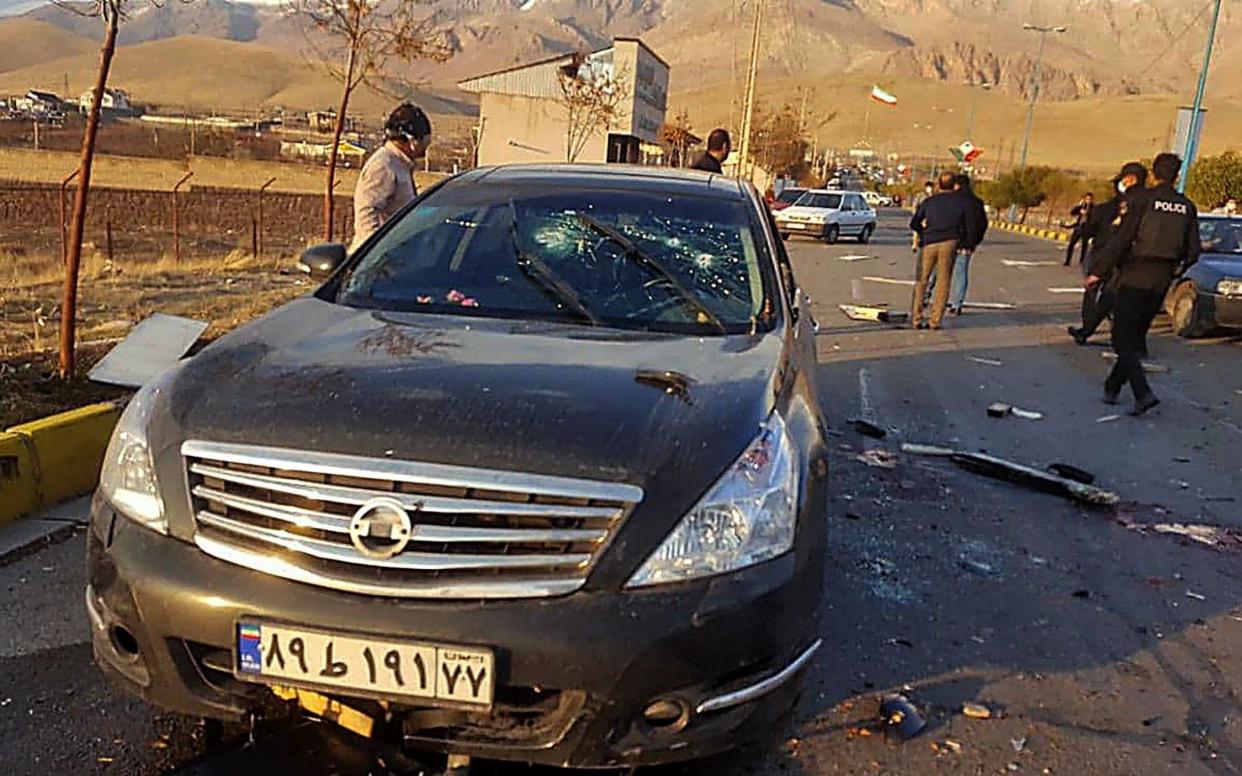Israel blamed for assassination of Iranian nuclear scientist Mohsen Fakhrizadeh

Iran blamed Israel for the killing of one of its top Iranian nuclear scientists in an assassination near Tehran on Friday that threatens to provoke a military confrontation during the final months of the Trump presidency.
Mohsen Fakhrizadeh succumbed to injuries in hospital after gunmen fired on his car in Damavand county, Iranian media reported.
Western and Israeli intelligence had long identified Mr Fakhrizadeh, 59, as the head of a covert Iranian project to develop a nuclear weapon that was shelved in 2003. He was subject to UN sanctions and named by the International Atomic Energy Agency in its 2015 "final assessment" of questions about Iran's nuclear programme.
Iran's President Hassan Rouhani on Saturday accused arch-foe Israel of acting as a "mercenary" for the US in carrying out the assassination.
"Once again, the wicked hands of the global arrogance, with the usurper Zionist regime as the mercenary, were stained with the blood of a son of this nation," Mr Rouhani said in a statement on his official website.
There were no immediate claims of responsibility for the attack but Iranian Foreign Minister Mohammad Javad Zarif said there were “serious indications” of Israeli involvement.
“Terrorists murdered an eminent Iranian scientist today,” he tweeted. “This cowardice—with serious indications of Israeli role—shows desperate warmongering of perpetrators.”
He called on the international community and particularly the European Union to condemn the killing "as an act of state terror".

Iranian figures vowed swift retaliation for Mr Fakhrizadeh’s killing, with the military adviser to Iran’s Supreme Leader Ayatollah Ali Khamenei also blaming “Zionists” for the assassination.
"In the last days of the political life of their ... ally [US President Donald Trump], the Zionists seek to intensify pressure on Iran and create a full-blown war," tweeted Hossein Dehgan.
"We will strike as thunder at the killers of this oppressed martyr and will make them regret their action.”
The chief of staff of Iran’s armed forces also threatened “severe revenge" for those behind the attack. "We assure (Iranians) that we will not rest until we have chased and punished" those responsible, Mohammad Bagheri tweeted.
Iranian media reported that the ambush in Absard town, less than 100km east of the capital Tehran, started when a pickup truck carrying explosives concealed under a cargo of wood exploded in front of Mr Fakhrizadeh's car. The vehicle was reportedly then sprayed with bullets from an SUV in another lane.
Photos taken at the scene show a black sedan with a shattered windscreen next to a pool of blood on a debris-strewn road.
Semi-official Fars news agency reported that witnesses claimed "three or four individuals, who are said to have been terrorists, were killed" in the attack.
The office of Israeli Prime Minister Benjamin Netanyahu said he would not comment on speculation that Mossad was behind the attack.
The Pentagon declined to comment. The State Department and White House did not immediately respond to requests for comment.

A brigadier general in the Islamic Revolutionary Guard Corps, Mr Fakhrizadeh was seen by Western and Israeli intelligence agencies as the father of Iran’s alleged nuclear weapons programme, with Mr Netanyahu identifying him by name in a 2018 presentation.
He is by far the most important Iranian nuclear scientist targeted for assassination. Tehran has previously accused Israel of complicity in the killing of four other Iranian nuclear scientists between 2010 and 2012.
Israeli agents have also reportedly carried out more recent assassinations in Iran, including of Al-Qaeda's second-in-command, who was allegedly killed by gunmen on a motorcycle in Tehran in August.
The New York Times reported earlier this month that Abu Muhammad al-Masri was shot alongside his daughter, who was the widow of Osama bin Laden’s son Hamza. Washington allegedly provided intelligence to support the attack.
Mr Fakhrizadeh’s killing comes amid concern at Iran’s growing enriched uranium stockpiles, which have exceeded limits imposed by a 2015 nuclear deal with world powers.
After President Trump unilaterally withdrew the US from the agreement in 2018, Iran progressively walked back its commitments to limit its nuclear work.
Tehran denies seeking atomic weapons, insisting its nuclear programme is for peaceful purposes.
In its final months in office, the outgoing administration of Mr Trump has vowed to intensify its “maximum pressure” campaign aimed at forcing Tehran to negotiate a more restrictive agreement.
US Secretary of State Mike Pompeo called Washington’s policy "extraordinarily effective" during a visit to Jerusalem last week.
On the same Middle East tour, Mr Pompeo refused to rule out a military strike against Iran during an interview with The National, a state-aligned newspaper in the United Arab Emirates.
The US and Iran looked close to war in January, when a US drone strike killed top Iranian general Qassem Soleimani in January.
The heightened tensions will likely complicate efforts by President-elect Joe Biden to rejoin the nuclear deal after he assumes office in January. The agreement is still supported by its other signatories the UK, China, France, Russia, Germany and Iran.

